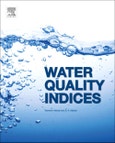This book covers water quality indices (WQI) in depth - it describes what purpose they serve, how they are generated, what are their strengths and weaknesses, and how to make the best use of them. It is a concise and unique guide to WQIs for chemists, chemical/environmental engineers and government officials.
Whereas it is easy to express the quantity of water, it is very difficult to express its quality because a large number of variables determine the water quality. WQIs seek to resolve the difficulty by translating a set of a large number of variables to a one-digit or a two-digit numeral. They are essential in communicating the status of different water resources in terms of water quality and the impact of various factors on it to policy makers, service personnel, and the lay public. Further they are exceedingly useful in the monitoring and management of water quality.
With the importance of water and water quality increasing exponentially, the importance of this topic is also set to increase enormously because only with the use of indices is it possible to assess, express, communicate, and monitor the overall quality of any water source.
Please Note: This is an On Demand product, delivery may take up to 11 working days after payment has been received.
Table of Contents
Part 1: Water Quality Indices Based Predominantly on Physico-chemical characteristics
1. Why water quality indices 2. Approaches to WQI formulation 3. Conventional Indices for determining fitness of waters for different uses 4. Combating uncertainities in indice-based assessment of water quality: The use of more advanced statistics, probability theory, and artificial intelligence 5. Indices based on relatively advanced statistical analysis of water quality data 6. Water quality indices based on fuzzy logic and other methods of artificial intelligence 7. Probabilistic or stochastic water quality indices 8. Planning or decision making indices 9. Indices for assessing groundwater quality 10. Water quality indices of USA and Canada 11. WQI generating software and a WQI-based virtual instrument
Part 2: Water Quality Indices Based on Bioassessment
12. Water quality indices based on bioassessment: an introduction 13. The biotic indices 14. Indices of biological integrity or the multimetric indices 15. Multivariate approaches for bioassessment of water quality
Part 3: Looking Back, Looking Ahead
16. Water quality indices : Looking back, looking ahead








